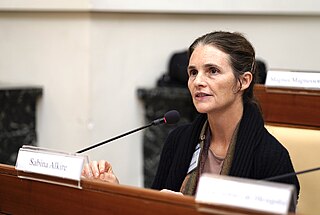Quality of life (QOL) is defined by the World Health Organization as "an individual's perception of their position in life in the context of the culture and value systems in which they live and in relation to their goals, expectations, standards and concerns". Standard indicators of the quality of life include wealth, employment, the environment, physical and mental health, education, recreation and leisure time, social belonging, religious beliefs, safety, security and freedom. QOL has a wide range of contexts, including the fields of international development, healthcare, politics and employment. Health related QOL (HRQOL) is an evaluation of QOL and its relationship with health.

In sociology, anomie is a social condition defined by an uprooting or breakdown of any moral values, standards or guidance for individuals to follow. Anomie is believed to possibly evolve from conflict of belief systems and causes breakdown of social bonds between an individual and the community. An example is alienation in a person that can progress into a dysfunctional inability to integrate within normative situations of their social world such as finding a job, achieving success in relationships, etc.

Amartya Kumar Sen is an Indian economist and philosopher, who since 1972 has taught and worked in the United Kingdom and the United States. Sen has made contributions to welfare economics, social choice theory, economic and social justice, economic theories of famines, decision theory, development economics, public health, and measures of well-being of countries.

In the economics study of the public sector, economic and social development is the process by which the economic well-being and quality of life of a nation, region, local community, or an individual are improved according to targeted goals and objectives.
Economic freedom, or economic liberty, is the ability of people of a society to take economic actions. This is a term used in economic and policy debates as well as in the philosophy of economics. One approach to economic freedom comes from the liberal tradition emphasizing free markets, free trade, and private property under free enterprise. Another approach to economic freedom extends the welfare economics study of individual choice, with greater economic freedom coming from a larger set of possible choices. Other conceptions of economic freedom include freedom from want and the freedom to engage in collective bargaining.

Development theory is a collection of theories about how desirable change in society is best achieved. Such theories draw on a variety of social science disciplines and approaches. In this article, multiple theories are discussed, as are recent developments with regard to these theories. Depending on which theory that is being looked at, there are different explanations to the process of development and their inequalities.

The capability approach is a normative approach to human welfare that concentrates on the actual capability of persons to achieve lives they value rather than solely having a right or freedom to do so. It was conceived in the 1980s as an alternative approach to welfare economics. In this approach, Amartya Sen and Martha Nussbaum combine a range of ideas that were previously excluded from traditional approaches to welfare economics. The core focus of the capability approach is improving access to the tools people use to live a fulfilling life.

The Happy Planet Index (HPI) is an index of human well-being and environmental impact that was introduced by the New Economics Foundation in 2006. Each country's HPI value is a function of its average subjective life satisfaction, life expectancy at birth, and ecological footprint per capita. The exact function is a little more complex, but conceptually it approximates multiplying life satisfaction and life expectancy and dividing that by the ecological footprint. The index is weighted to give progressively higher scores to nations with lower ecological footprints.
The economics of happiness or happiness economics is the theoretical, qualitative and quantitative study of happiness and quality of life, including positive and negative affects, well-being, life satisfaction and related concepts – typically tying economics more closely than usual with other social sciences, like sociology and psychology, as well as physical health. It typically treats subjective happiness-related measures, as well as more objective quality of life indices, rather than wealth, income or profit, as something to be maximized.
Human development involves studies of the human condition with its core being the capability approach. The inequality adjusted Human Development Index is used as a way of measuring actual progress in human development by the United Nations. It is an alternative approach to a single focus on economic growth, and focused more on social justice, as a way of understanding progress

The Oxford Poverty and Human Development Initiative (OPHI) is an economic research centre within the Oxford Department of International Development at the University of Oxford, England, that was established in 2007.

Housing inequality is a disparity in the quality of housing in a society which is a form of economic inequality. The right to housing is recognized by many national constitutions, and the lack of adequate housing can have adverse consequences for an individual or a family. The term may apply regionally, temporally or culturally. Housing inequality is directly related to racial, social, income and wealth inequality. It is often the result of market forces, discrimination and segregation.
The OECD Better Life Index, created in May 2011 by the Organisation for Economic Co-operation and Development, is an initiative pioneering the development of economic indicators which better capture multiple dimensions of economic and social progress. The platform consists of a dashboard, that provides data and insights into key indicators - measuring areas such as wellbeing, environmental quality, quality of public services and security - alongside an interactive tool Your Better Life Index (BLI), which encourages citizens to create their own indexes by ranking each of the indicators according to the importance in their own lives.
Although for many decades, it was customary to focus on GDP and other measures of national income, there has been growing interest in developing broad measures of economic well-being. National and international approaches include the Beyond GDP programme developed by the European Union, the Better Lives Compendium of Indicators developed by the OECD, as well as many alternative metrics of wellbeing or happiness. One of the earliest attempts to develop such an index at national level was Bhutan's Gross National Happiness Index and there are a now a number of similar projects ongoing around the world, including a project to develop for the UK an assessment of national well-being, commissioned by the Prime Minister David Cameron and led by the Office for National Statistics.

Sabina Alkire is the director of the Oxford Poverty and Human Development Initiative (OPHI), an economic research centre within the Oxford Department of International Development at the University of Oxford, England, which was established in 2007. She is a fellow of the Human Development and Capability Association. She has worked with organizations such as the Commission on the Measurement of Economic Performance and Social Progress, the United Nations Human Development Programme Human Development Report Office, the European Commission, and the UK's Department for International Development.
In statistics and research design, an index is a composite statistic – a measure of changes in a representative group of individual data points, or in other words, a compound measure that aggregates multiple indicators. Indexes – also known as composite indicators – summarize and rank specific observations.
Pamela Abbott, FAcSS is a British academic in sociology, gender and development studies. She is Director of the Centre for Global Development and Professor in the School of Education at the University of Aberdeen, and Director of the Centre for Global Development.

Kirsten Sehnbruch is a British Academy Global Professor and Distinguished Policy Fellow at the International Inequalities Institute at the London School of Economics and Political Science. Sehnbruch is known for her work on conceptualising and measuring the quality of employment, particularly in developing countries. Her research subjects include quality of employment, multidimensional indicators, Latin American labour markets, labour relations, Chilean politics and public policy.
Peter Herrmann is a social philosopher, sociologist and academic of German origin. Between 1995 and 2013 he worked in Ireland where he occupied at the end the position of a senior research fellow at University College Cork, School of Applied Social Studies. 2013 he moved to Rome, Italy, where he worked independently, but in close connection with the Italian research institute EURISPES. From 2015 to 2017 he worked as Professor for Economics at Bangor College of Central South University of Forestry & Technology, ChangSha, PRC, and as Senior Foreign Expert. School of Public Affairs, Dept. of Social Security and Risk Management, Zhejiang University, HangZhou, P.R.China. In September 2017 he commenced a one-year research position at the Max Planck Institute for Social Law and Social Policy in Munich, Bavaria, from where he changed in October 2018 to the Faculty of Economics and Sociology at the University of Lodz in Poland. Since October 2019 he is Research Fellow at the Human Rights Centre. Law School at Central South University, Changsha, PRC.

John F. Helliwell is a Canadian economist and editor of the World Happiness Report. He is a senior fellow of the Canadian Institute for Advanced Research (CIFAR) and co-director of the CIFAR Programme on Social Interactions, Identity, and Well-Being; Board Director of the International Positive Psychology Association, and professor emeritus of Economics at the University of British Columbia.











